As night closed in around us we hugged the kids goodbye and made our way back to our rooms to wash up, have dinner and enjoy a night of bonding over “Catch Phrase” and poker. We kept Robbie up until the wee hours of the morning, which was only a problem because he was preaching the next morning. But despite their fatigue Robbie and Bonongwe (who had emceed the entire 5 hour plus choir competition with his usual verve and intensity, and had then stayed up past midnight working on the new boreholes that VIP was drilling) delivered an excellent sermon together the next morning at church. We also had the opportunity to watch the VIP Choir (consisting of Gayle, Nicole and John Anderson, Sandra Hurlbert, Jordan Heinzel- Nelson, Enoch Smith, Sydney Chikalema and Isaac Mawlabu) performing alongside a local Malawian choir, who had been provided with matching shirts by Gayle’s church four years ago when she had first come to Malawi. So many people went up to the front of the church together that Trudy got caught up in the wake of all the bodies and ended up performing along with everyone else, even though she had not practiced any of the songs or accompanying dances. The choirs, Trudy included (or perhaps especially), did a wonderful job and earned an ovation from the entire congregation.
After church it was time for what is for many the most emotional part of the Friendship Trips: home visits to the most vulnerable families in our catchment area. These families, generally as a result of disability, disease or death, struggle to make ends meet even more than their neighbors. They are often led by elderly widows or orphans and they may lack the familial safety net that many other Malawian villagers rely on. During a drought, flood or famine it is the vulnerable families who suffer the most, as they are the people living on the knife’s edge between survival and catastrophe.
We broke off into pairs, with each pair scheduled to visit two vulnerable families, accompanied by a VIP staff member to help translate, as most Malawians living in the rural villages do not speak English. Tory and I were paired with Frank, who as an orphan raised in the villages, had once come from a vulnerable family himself. The first home that Frank took us to was the home of an elderly widow who cared for some of her orphaned grandchildren.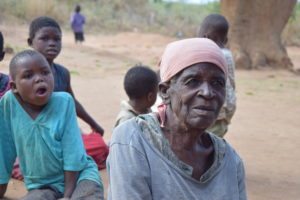 She wasn’t certain how old she was, but one of her middle-aged daughters, who lived nearby, told us that she thought that her mom was 89. We sat together on the ground talking about her life and everything that she had seen over the years. She told us that while she had endured drought and famine in her youth, she had no doubt that droughts were becoming more and more common in later years, a trend which both she and almost all scientists attribute to the effects of global warming. After talking for a few more minutes about the weather and how her harvest had been the last few years (2016 had been bad because of the drought, while 2017 had been better, though she was still anticipating running out of food before the next harvest) the talk moved to the children who had gathered around us.
She wasn’t certain how old she was, but one of her middle-aged daughters, who lived nearby, told us that she thought that her mom was 89. We sat together on the ground talking about her life and everything that she had seen over the years. She told us that while she had endured drought and famine in her youth, she had no doubt that droughts were becoming more and more common in later years, a trend which both she and almost all scientists attribute to the effects of global warming. After talking for a few more minutes about the weather and how her harvest had been the last few years (2016 had been bad because of the drought, while 2017 had been better, though she was still anticipating running out of food before the next harvest) the talk moved to the children who had gathered around us.
We asked her if all of her grandchildren went to school and she proudly told us yes. This was impressive enough by itself. As an elderly widow she needed help in the fields and with household chores, and she told us that her grandchildren would wake up early, work with her in the fields and help gather water and fire wood for a few hours, go to school, and then help her again in the afternoon. Almost all of the grandchildren were younger than 10. As we asked each of the children in turn what grade they were in and how well they had done in school that year, her oldest grandson told us, in confident English, that he had finished first in standard 5 at Nyambwe Primary school that year. It was amazing to hear that a boy from one of the most vulnerable families in his village could have finished first in his grade, when he had so many other responsibilities and burdens in his young life. In a whispered discussion, Tory and I decided that we should give the boy one of the LuminAIDs, small solar powered lights that Liz had given us, which we each carried in our backpacks.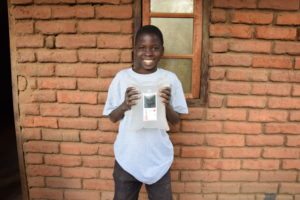 VIP has given out LuminAIDs, which can be recharged each day and which will last for over 5 years, to top students for the past several years now. The LuminAID would allow him to read, study and see late into the night, something that we hoped would both reward, and allow for the continuation of, his academic success. As we handed it to him and showed him how to use it, he beamed with pride and happiness, thanking us for the gift and showing it off proudly to his grandmother, brothers and sisters and cousins and aunts.
VIP has given out LuminAIDs, which can be recharged each day and which will last for over 5 years, to top students for the past several years now. The LuminAID would allow him to read, study and see late into the night, something that we hoped would both reward, and allow for the continuation of, his academic success. As we handed it to him and showed him how to use it, he beamed with pride and happiness, thanking us for the gift and showing it off proudly to his grandmother, brothers and sisters and cousins and aunts.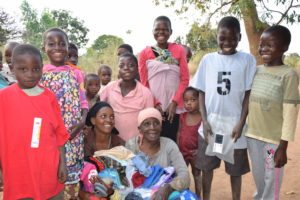
After giving the rest of the family the small gifts that we had brought with us, blankets, clothes, flip flops and toiletries, Tory and I shook hands with everyone and followed Frank to a house located roughly 100 yards away, down a narrow dirt road that cut through trees and a few other properties. As we approached we saw the homeowner, a young woman in her 30’s, bent over a fire, preparing to make Mandazi, which she and her children would then sell along the roadside for 50 kwacha each.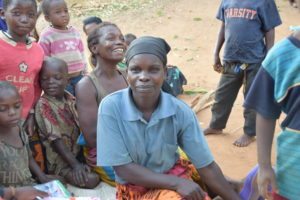 She asked one of her daughters to mind the fire for her and came over to shake our hands and gestured for us to join her on a mat that she laid out for us, on the ground next to her home. As we talked, two kids sat down in mine and Tory’s laps. The boy who sat on Tory’s lap had been adopted by the young woman after his parents had died, but no one was sure where the little girl that sat on my lap had come from. I asked the woman if maybe she wanted to adopt her too, to which everyone politely chuckled. After talking for a few more minutes, and just when I had started to wonder if the little girl was potty-trained, I began to feel, with increasing horror, a wet spot growing on my pants leg. “I think she is peeing on my leg,” I whispered urgently to Tory, who immediately began to laugh. As I moved the little girl to the side and stood up I found that she had indeed peed on my leg, and soon everyone was howling with laughter. “It looks like you will be adopting her” Frank said to me as he patted me on my back and grinned.
She asked one of her daughters to mind the fire for her and came over to shake our hands and gestured for us to join her on a mat that she laid out for us, on the ground next to her home. As we talked, two kids sat down in mine and Tory’s laps. The boy who sat on Tory’s lap had been adopted by the young woman after his parents had died, but no one was sure where the little girl that sat on my lap had come from. I asked the woman if maybe she wanted to adopt her too, to which everyone politely chuckled. After talking for a few more minutes, and just when I had started to wonder if the little girl was potty-trained, I began to feel, with increasing horror, a wet spot growing on my pants leg. “I think she is peeing on my leg,” I whispered urgently to Tory, who immediately began to laugh. As I moved the little girl to the side and stood up I found that she had indeed peed on my leg, and soon everyone was howling with laughter. “It looks like you will be adopting her” Frank said to me as he patted me on my back and grinned.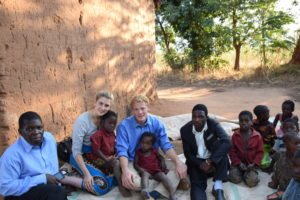
After cleaning my pant leg off with some wet wipes, Tory and I asked if we could see inside the young woman’s house. She said yes and we followed her inside. As we ducked our heads under the door frame, we suddenly found ourselves plunged into darkness. I remained frozen at the entryway for a moment until my eyes began to adjust to the darkness. I kept waiting for shapes to appear out of the gloom but nothing did. After thinking something must be wrong with my eyes, I slowly realized why I couldn’t see anything: the room we had stepped into was completely bare. There was no furniture in the room, no pictures on the walls, and no carpets on the floor. There was nothing except dirt and bits of straw that had fallen from the roof. I looked up at the ceiling and saw that rats had chewed away pieces of the roof, leaving small holes that allowed dull beams of dusty light to penetrate into the darkness of the room. In the rainy season the rain must leaked all over her floor, turning it to mud. We walked into the other two rooms and listened as another translator (Frank had waited outside as it is not proper for a grown Malawian male to come into a woman’s home) told us that at night her chickens and goats came in to the house to sleep on the floor with her and her children. There were only three rooms in the entire house and all told it was smaller than the bedroom I had grown up in back home.
I stood inside that dark house for what could have been a few moments or several hours, as everything I had experienced suddenly caught up with me at once, the shock of which forced me to remain motionless. I thought of the 89 year old woman that we had just met and I realized that she had spent all the long years of her life living in a house just like this. She had been born in a house like this and she would die in a house like this.
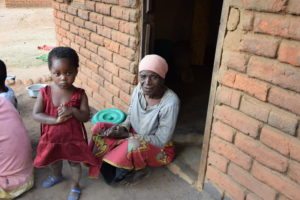
I was suddenly struck by how unjust it all was. Why was my life so easy? Why had I been given so much, when these women that I had just met had been given so little? The reality that confronted me was so at odds with everything that I believe to be right and fair. I had unlimited opportunities, I had received a world class education, I had the freedom to chart my own future, I was able to travel the world, seeking love and friendship, discovering the wonders of this planet, while these women would never leave the villages they had been born in. They would always be here, sleeping on the floor, left to the mercy of the changing seasons year after year. For the first time in Malawi I became frustrated. Frustrated that the randomness of birth consigned billions of people to lives of hardship and poverty. Frustrated that my own country is so willing to spend hundreds of billions of dollars on arms and weapons, useful only to destroy and kill (or more likely collect dust) while we can’t seem to spare much for people living in unimaginable poverty. Frustrated that the whole world seemed to have their priorities completely backwards. Frustrated that we organize our societies around, and build cults dedicated to the worship of, excessive accumulations of wealth, while ignoring those whose basic needs are not fulfilled. Frustrated that I couldn’t do anything about all this.
But slowly my frustration turned to amazement. Amazement because, despite the challenges, the endless setbacks and roadblocks, the seeming powerlessness of any one person to fix a problem so daunting, people like Liz carried out the small, slow, steady work to begin changing the world year after year. VIP is too small to end poverty in Sakata by itself, let alone in all of Malawi or the world at large. But we can’t just throw up our hands and do nothing. Each person has to do their part, however big or small it may be, and person by person, family by family, village by village, lives will begin to improve. As we bought some Mandazi from the woman and walked back to our car, I was reminded of an old story I used to tell my students:
Once upon a time an old man was walking along a beach the morning after a terrible storm. As he walked along the shoreline, watching the last of the storm clouds disappear out over the ocean, he saw that the sand far ahead of him was colored differently than the rest. He continued walking, thinking that the storm has churned up the silty shoreline and covered it with a different kind of sand. But as he got closer he saw that it wasn’t the sand at all, the beach was covered with starfish as far as the eye could see. As his gaze carried him further down the beach he saw a little girl picking up the starfish one by one and throwing them back in the ocean. The old man walked up to the girl and asked her what she was doing. “The starfish have been washed onto the beach by the storm,” the little girl replied. “If they stay on the sand the sun will dry them out and they’ll die.” The old man gave the little girl a patronizing smile, shook his head and said, “Young lady. Stop and look for a minute. The starfish extend for miles down the beach. There could be millions of them. Even if you stay here all day you will never make a difference.” The young girl paused and considered the old man’s words for a moment. Then she bent down, picked up another starfish and threw it into the ocean. As it splashed safely back into the water she looked back at the old man and said simply, “I made a difference to that one.”

Leave a Reply